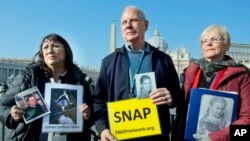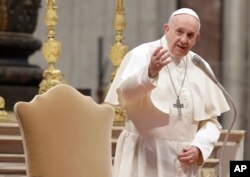In the study of his home outside Washington, former priest Tom Doyle searched a shelf packed with books to find the thick report that led him to walk away from the priesthood and become an advocate for victims of sexual abuse by clergymen.
The 1985 report was one of the first exposes in a sexual abuse scandal that has plagued the Catholic Church. Pope Francis has called senior bishops to meet for four days starting Thursday to discuss how to tackle the worsening crisis.
Doyle, who lost his job soon after the report was made public and eventually decided to leave the priesthood, is deeply skeptical that anything of substance will come of this week's meeting.
"They're going to pray and they're going to meditate. But it's totally useless," he said. "You shouldn't have to have something like this in 2019. These men should know right out of the gate that if you have a priest who's raping children, you don't allow them to continue."
The meeting comes after a year in which fresh revelations about abuse of children and cover-up has shaken the church globally and tested the pope's authority. Predatory priests were often moved from parish to parish rather than expelled or criminally prosecuted as bishops covered up the abuse.
Monsignor Stephen Rossetti, 67, a professor at Catholic University, said that U.S. bishops have already taken decisive steps to keep children from being abused. In 2002, after decades of abuse in the Boston area became public, the U.S. Conference of Catholic Bishops (USCCB) passed a charter including requirements to report allegations of abuse of minors to police and to remove abusive priests or deacons after a single offense.
"The bishops of the United States are following zero tolerance," said Rossetti, who helped draft the charter. "If you molested a minor at any time in your life, you're not going to be a priest in this country. Period."
Rossetti said the pope and the bishops should use the Vatican meeting to push for similar reforms in other countries where the problem of abuse is still coming to light.
But the U.S. policy "still left the bishops off the hook," said David Lorenz, a director at Survivors Network of those Abused by Priests, or SNAP. He called the pope's summit "a publicity stunt."
Recalling how he was abused at age 16 by a priest at an all-boys high school in Kentucky, Lorenz said the church and bishops with secrets of their own will continue to cover up abuse.
"It's the secrecy. It's the silence. It's because I was silent for so long," Lorenz, now 60, said, welling up. "They rely on that."






